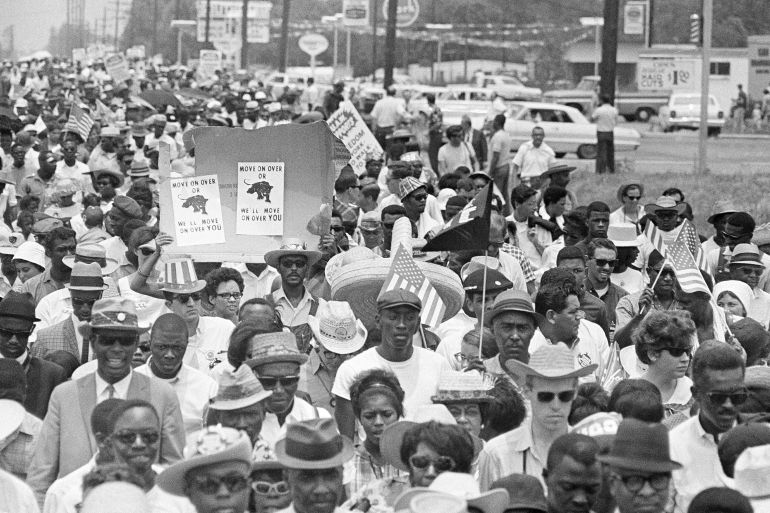Why Black History Month makes me feel like a failure
I feel like I’m letting my Black ancestors down by how little I know about them.

Every February, I am reminded just how little I know about my own history.
I am midway through an interview with a seasoned Black activist. They are talking about Black liberation and dropping names I should know. I school my face to look anything but blank and nod intermittently to indicate that I get what they are saying. When they make a point that their vocalisation suggests is particularly salient, I dip my head sagely and intone, “mmhmmm,” the way Black folks do to succinctly convey understanding and shared experience. In reality, I have no clue what they’re talking about.
Keep reading
list of 4 itemsWhy does American travel writing erase Black people?
Florence Price: The story of America’s forgotten musical genius
Why did a hazing in Belgium lead to a Black student’s death?
Black History Month is the only time I really struggle with impostor syndrome, a sneaking feeling of not being enough that experts agree disproportionately affects women of colour. Every February, editors assign me articles related to Black history. Little do they know how little I actually know about it.
Terms like “white privilege” and “restorative justice” are relative newcomers to my personal lexicon. I cannot tell you who “the first Black person to do X” was unless you’re asking me about the US presidency. I have never even listened to a Tupac album.
Black folks usually get this education over a lifetime, at home and through extended family and friends, but I did not. I feel like I am trying to fast-track a PhD in Blackness, and I am exhausted.
I am not from a family of Civil Rights activists. We were not the kind to force our way to the front of the bus or march from Selma to Montgomery. My dad missed Martin Luther King, Jr’s “I have a dream” speech because Granddaddy said it was too dangerous for him to go. As adults, both my parents wanted out of the urban environments they grew up in and were more interested in following Jesus than fighting for civil rights.
I do not remember us ever really talking about race as a family. We watched films and series like Roots, Eyes on the Prize, and Malcolm X together, and I read a few seminal pieces like Narrative of the Life of Frederick Douglass and a handful of essays by WEB Du Bois, but that was pretty much the extent of my racial education.
But that did not mean I wasn’t getting messages about Blackness. I grew up during a heyday of Black respectability politics, in which leaders like Jesse Jackson exhorted Black people to uplift themselves and high-profile African Americans like Condoleeza Rice and Colin Powell aligned themselves with “law and order” political conservatism.
My mother homeschooled me using evangelical Christian curricula from Abeka – whose history books contain gems like, “the slave who knew Christ had more freedom than a free person who did not know the Savior” – and Bob Jones, a university my parents would not have even been able to attend due to its policy forbidding mixed-race marriages.
I have only recently learned how deeply entrenched and internalised anti-Black racism is within my mother’s Puerto Rican family. My grandmother, whose own father ostracised her because she was darker-complected than her sisters, was downright gleeful when she met my white partner, who she said could help us racially “purify” our family. This practice of blanqueamiento is commonplace in Latinidad. I wonder how she felt when I was born with darker skin than any living person on either side of my family.
Nearly 40 years later, I feel like I am letting my Black ancestors down by how little I know about them. I am trying to rectify this by reading, listening to podcasts, and watching documentaries, but it is a painfully slow process.
When social media reveals all that my white friends have learned during this global racial awakening, I feel a prickle of shame that many now know more than I do about Black American history.
I envy the fact that they come to lessons about the history of enslavement and oppression relatively unencumbered. Generations later, I still carry in my body the trauma of the people that history happened to.
I am sensitive to depictions of violence against Black bodies and – especially because my anxiety disorder and depression make me prone to rumination – I have to be extremely careful with how much I expose myself to. Last week, I had to turn off the documentary 13th when graphic images of lynched people unexpectedly flickered across the screen. Other times, it is the insidious banality of systemic racism, which has tentacles in everything from board games to farm loans, that is too much for me to stomach.
Telling the truth about Black history is critical to racial healing and reconciliation in the US, and I know that it is also vital to my own “internal reparations” – another term I picked up during a recent interview. But it is a protracted process, and this Black History Month, I have decided that I need to cut myself some slack. I may not (yet) be able to recite the Black Panthers Ten-Point Program from memory or wax poetic about Audre Lorde’s key works, but by following my curiosity and researching and writing about Black culture, I am able to learn from Black activists, artists, and thought leaders who are making history now. I won’t be an impostor for long.